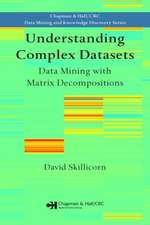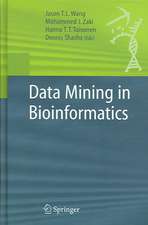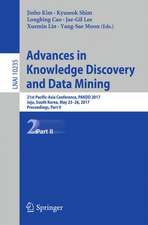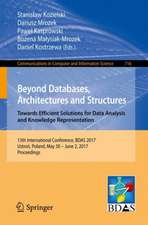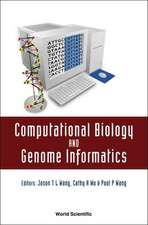Bioinformatics Database Systems
Autor Kevin Byron, Katherine G. Herbert, Jason T. L. Wangen Limba Engleză Paperback – 30 iun 2020
The book summarizes the popular and innovative bioinformatics repositories currently available, including popular primary genetic and protein sequence databases, phylogenetic databases, structure and pathway databases, microarray databases and boutique databases. It also explores the data quality and information integration issues currently involved with managing bioinformatics databases, including data quality issues that have been observed, and efforts in the data cleaning field.
Biological data integration issues are also covered in-depth, and the book demonstrates how data integration can create new repositories to address the needs of the biological communities. It also presents typical data integration architectures employed in current bioinformatics databases.
The latter part of the book covers biological data mining and biological data processing approaches using cloud-based technologies. General data mining approaches are discussed, as well as specific data mining methodologies that have been successfully deployed in biological data mining applications. Two biological data mining case studies are also included to illustrate how data, query, and analysis methods are integrated into user-friendly systems.
Aimed at researchers and developers of bioinformatics database systems, the book is also useful as a supplementary textbook for a one-semester upper-level undergraduate course, or an introductory graduate bioinformatics course.
| Toate formatele și edițiile | Preț | Express |
|---|---|---|
| Paperback (1) | 422.97 lei 6-8 săpt. | |
| CRC Press – 30 iun 2020 | 422.97 lei 6-8 săpt. | |
| Hardback (1) | 586.11 lei 6-8 săpt. | |
| CRC Press – 15 dec 2016 | 586.11 lei 6-8 săpt. |
Preț: 422.97 lei
Nou
Puncte Express: 634
Preț estimativ în valută:
80.94€ • 84.68$ • 67.23£
80.94€ • 84.68$ • 67.23£
Carte tipărită la comandă
Livrare economică 02-16 aprilie
Preluare comenzi: 021 569.72.76
Specificații
ISBN-13: 9780367574062
ISBN-10: 0367574063
Pagini: 290
Dimensiuni: 156 x 234 x 15 mm
Greutate: 0.46 kg
Ediția:1
Editura: CRC Press
Colecția CRC Press
Locul publicării:Boca Raton, United States
ISBN-10: 0367574063
Pagini: 290
Dimensiuni: 156 x 234 x 15 mm
Greutate: 0.46 kg
Ediția:1
Editura: CRC Press
Colecția CRC Press
Locul publicării:Boca Raton, United States
Cuprins
OVERVIEW OF BIOINFORMATICS DATABASES. Introduction. Sequence Databases. Phylogenetic Databases. Structure And Pathway Databases. Microarray And Boutique Bioinformatics Databases. BIOLOGICAL DATA CLEANING. Introduction. General Data Cleaning. A Case Study In Biological Data Cleaning. BIOLOGICAL DATA INTEGRATION. Introduction. General Data Integration. Three Areas In Biological Data Integration. BIOLOGICAL DATA SEARCHING. Introduction. Biological Data Searching Using Blast. Biological Data Searching Using The Ucsc. Genome Browser And Blat. A Case Study In Phylogenetic Tree Database Search. A Case Study In Rna Pseudoknot Database Search. BIOLOGICAL DATA MINING. Introduction. General Data Mining. Biological Data Mining. A Case Study In Biological Pattern Discovery. A Case Study In Biological Data Mining. BIOLOGICAL NETWORK INFERENCE. Introduction. Gene Regulatory Network Inference. CLOUD-BASED BIOLOGICAL DATA PROCESSING. Introduction. Data Processing In The Cloud. Biological Data. Processing In The Cloud
Notă biografică
Kevin Byron is a PhD candidate in the Department of Computer Science at the New Jersey Institute of Technology.
Katherine G. Herbert is Associate Professor of Computer Science at Montclair State University.
Jason T.L. Wang is Professor of Bioinformatics and Computer Science at the New Jersey Institute of Technology.
Katherine G. Herbert is Associate Professor of Computer Science at Montclair State University.
Jason T.L. Wang is Professor of Bioinformatics and Computer Science at the New Jersey Institute of Technology.
Descriere
This book explains the world of database systems to bioinformatics and cheminformatics database users. It begins with a survey of popular databases, including primary genetic and protein sequence, phylogenetic, structure and pathway, and microarray databases. The text discusses information management and modeling issues in these databases, addre




